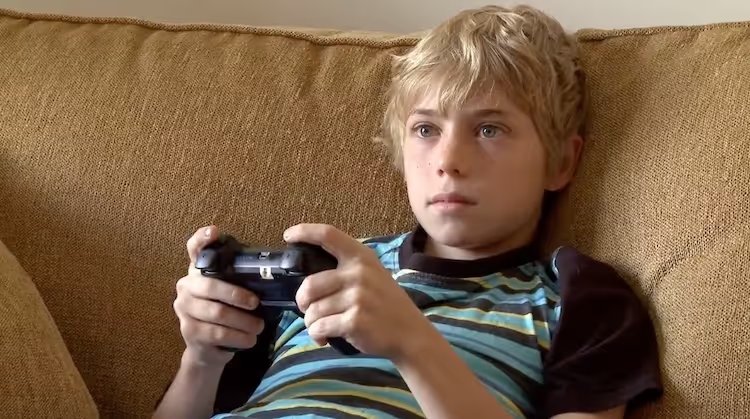


I strongly believe that one of the most powerful aspects of Tech Talk Tuesday is starting the discussion with something positive about the tech in our lives. Kids are so used to hearing our negatives about tech time, that they may start to tune out if the discussion if it is not balanced. If we really want to have effective dialogue that creates a lasting tech balance with our kids, we need to talk about the positives too. Believe me, your kids will want to hear this week’s TTT.
I recently read a controversial article in American Psychologist, the journal of the American Psychological Association, about why video games can have some benefits. I say controversial because there clearly are very pro-violent video games. Improved reflexes and faster processing of their environment after playing shooter video games were some of the study’s findings. The authors of "The Benefits of Playing Video Games" write:
“Compared to control participants, those in the shooter video game show... higher spatial resolution in visual processing, and enhanced mental rotation abilities.”
Ask your kids if they feel any cognitive benefits after they’ve played a video game and they are doing another activity.
Next, share this excerpt from the same article with your kids:
“Gaming may be among the most efficient and effective means by which children and youth generate positive feelings. Several studies have shown a causal relation between playing preferred video games and improved mood or increases in positive emotion.”
After you read this excerpt to your kids, talk with them about what kinds of feelings they experience right after they play a fun video game. Then, ask them if they ever have sad or hard feelings during the day and, if so, do they then have an urge to play the game that makes them feel good.
Learn more about showing our movies in your school or community!
Join Screenagers filmmaker Delaney Ruston MD for our latest Podcast

Learn more about our Screen-Free Sleep campaign at the website!
Our movie made for parents and educators of younger kids
Learn more about showing our movies in your school or community!
Learn more about showing our movies in your school or community!
Join Screenagers filmmaker Delaney Ruston MD for our latest Podcast

Learn more about our Screen-Free Sleep campaign at the website!
Our movie made for parents and educators of younger kids
Join Screenagers filmmaker Delaney Ruston MD for our latest Podcast
As we’re about to celebrate 10 years of Screenagers, we want to hear what’s been most helpful and what you’d like to see next.
Please click here to share your thoughts with us in our community survey. It only takes 5–10 minutes, and everyone who completes it will be entered to win one of five $50 Amazon vouchers.
I strongly believe that one of the most powerful aspects of Tech Talk Tuesday is starting the discussion with something positive about the tech in our lives. Kids are so used to hearing our negatives about tech time, that they may start to tune out if the discussion if it is not balanced. If we really want to have effective dialogue that creates a lasting tech balance with our kids, we need to talk about the positives too. Believe me, your kids will want to hear this week’s TTT.
I recently read a controversial article in American Psychologist, the journal of the American Psychological Association, about why video games can have some benefits. I say controversial because there clearly are very pro-violent video games. Improved reflexes and faster processing of their environment after playing shooter video games were some of the study’s findings. The authors of "The Benefits of Playing Video Games" write:
“Compared to control participants, those in the shooter video game show... higher spatial resolution in visual processing, and enhanced mental rotation abilities.”
Ask your kids if they feel any cognitive benefits after they’ve played a video game and they are doing another activity.
Next, share this excerpt from the same article with your kids:
“Gaming may be among the most efficient and effective means by which children and youth generate positive feelings. Several studies have shown a causal relation between playing preferred video games and improved mood or increases in positive emotion.”
After you read this excerpt to your kids, talk with them about what kinds of feelings they experience right after they play a fun video game. Then, ask them if they ever have sad or hard feelings during the day and, if so, do they then have an urge to play the game that makes them feel good.
Sign up here to receive the weekly Tech Talk Tuesdays newsletter from Screenagers filmmaker Delaney Ruston MD.
We respect your privacy.
I strongly believe that one of the most powerful aspects of Tech Talk Tuesday is starting the discussion with something positive about the tech in our lives. Kids are so used to hearing our negatives about tech time, that they may start to tune out if the discussion if it is not balanced. If we really want to have effective dialogue that creates a lasting tech balance with our kids, we need to talk about the positives too. Believe me, your kids will want to hear this week’s TTT.
I recently read a controversial article in American Psychologist, the journal of the American Psychological Association, about why video games can have some benefits. I say controversial because there clearly are very pro-violent video games. Improved reflexes and faster processing of their environment after playing shooter video games were some of the study’s findings. The authors of "The Benefits of Playing Video Games" write:
“Compared to control participants, those in the shooter video game show... higher spatial resolution in visual processing, and enhanced mental rotation abilities.”
Ask your kids if they feel any cognitive benefits after they’ve played a video game and they are doing another activity.
Next, share this excerpt from the same article with your kids:
“Gaming may be among the most efficient and effective means by which children and youth generate positive feelings. Several studies have shown a causal relation between playing preferred video games and improved mood or increases in positive emotion.”
After you read this excerpt to your kids, talk with them about what kinds of feelings they experience right after they play a fun video game. Then, ask them if they ever have sad or hard feelings during the day and, if so, do they then have an urge to play the game that makes them feel good.

Games like Roblox and Fortnite, which are especially popular among younger video gamers, may seem highly appealing due to their free-to-play model. Of course, they are not truly free. Young people are powerfully compelled to purchase in game currencies using real money, which in turn are used to purchase virtual items like costumes (skins) and weapons. Learn more about how this works in practice and what we can do as parents to help guide our kids.
READ MORE >
For a long time, people have been talking about how video games might be linked to extreme acts of violence, such as school shootings. The fact is millions of youth have played violent video games, and far less than 1% will ever do any such acts of violence. Today I look at two studies that shed more light on the ACTUAL effects that violent games can have on youth behaviors.
READ MORE >for more like this, DR. DELANEY RUSTON'S NEW BOOK, PARENTING IN THE SCREEN AGE, IS THE DEFINITIVE GUIDE FOR TODAY’S PARENTS. WITH INSIGHTS ON SCREEN TIME FROM RESEARCHERS, INPUT FROM KIDS & TEENS, THIS BOOK IS PACKED WITH SOLUTIONS FOR HOW TO START AND SUSTAIN PRODUCTIVE FAMILY TALKS ABOUT TECHNOLOGY AND IT’S IMPACT ON OUR MENTAL WELLBEING.
